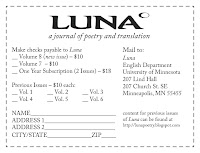 The Importance of Peeling Potatoes in Ukraine
The Importance of Peeling Potatoes in UkraineMARK YAKICH
Penguin, $18
In the current climate of disingenuous government policies and deceptive politics it’s difficult for any American citizen not to be cynical. And the role of the artist in this troubled environment is to play back the absurdity of the times. Perhaps someone will listen. This is a precarious position, but Mark Yakich soldiers on undeterred in his second book of poems whose choice weapons are intelligent wit and mischievous humor.
From the start, in the poem “Tourist Beware,” the speaker calls to task his own mission, pointing out the futility of the act of writing:
The range of Yakich’s reach is surprising, covering a vast range of emotion. Of note is the long poem in response to Hurricane Katrina, “Green Zone New Orleans,” which concludes with the haunting lines:
The title of the book suggests that potato-peeling in Ukraine will play a central role in the book (though the poem “A Brief History of Patriotism” traces the potato’s journey through the ages), both the tuber and the country remain out of limelight. This is by design since in “Proof Text,” the second poem in the collection, the speaker let’s the reader know: “The actual lives that are lived in atrocious times and distant places can never be told—out of fear that they will be either too beautiful or too true.”
Not much is done subtly or quietly or without the battery-shock of the tongue in The Importance of Peeling Potatoes in Ukraine. But then again, this is the era of reality TV, peace missions, War on Terror, and other frightening oxymoron that demand the poet step off the page and into the mix of the world’s theater. It’s refreshing to have Yakich rise above the tame and timid poems that delegate American poetry as apolitical, and therefore inert.
by Rigoberto González
Penguin, $18
In the current climate of disingenuous government policies and deceptive politics it’s difficult for any American citizen not to be cynical. And the role of the artist in this troubled environment is to play back the absurdity of the times. Perhaps someone will listen. This is a precarious position, but Mark Yakich soldiers on undeterred in his second book of poems whose choice weapons are intelligent wit and mischievous humor.
From the start, in the poem “Tourist Beware,” the speaker calls to task his own mission, pointing out the futility of the act of writing:
Humorous poetry is published exclusivelyYet, “sometimes the subject matter is hard to pass up,” the speaker admits in “Holy Sonnet”:
One month of the year when everybody is
On summer vacation. More than poetry,
Vacation is protest.
Take Jesus. He was a very secure artist.The impulse is more passionately articulated in the post-911 poem “September 12”:
He didn’t doubt his talent. He never talked
About it because it was like having blue eyes.
...We didn’tIndeed, this “little book” does plenty, subverting the reader’s expectations from the poems titled “Patriot Acts” and “New Pathways to Peace in the Middle East” with language that is no less nonsensical, illogical and strange as the one spoken by the national and international leaders. Thus, no figurehead is spared the irreverent axe that Yakich wields. From the spell to locate Osama Bin Laden, to Fidel Castro’s letter to Dear Abby, to the poem “Oedipus” dedicated to John F. Kennedy, Jr., everyone’s getting cut and reshuffled: “Don’t worry, we’ll let you fuck the heroes when we’re done with them.”
Intend to provoke a lot of bad feelings in
Its reader. We weren’t even thinking about
War or fear or safety of courage. We know
That you can get those things elsewhere,
That in other arts, say, at the movies,
You can be moved to small tears or that,
Say, at the symphony you can fall
Asleep gently and unnoticed. After all, what’s
A little book of poems going to do
For you?
The range of Yakich’s reach is surprising, covering a vast range of emotion. Of note is the long poem in response to Hurricane Katrina, “Green Zone New Orleans,” which concludes with the haunting lines:
For once upon a time,And not far behind are Yakich’s sexual puns like “nothing/ Beats a penis like personal/ Experience” and the poem “Bow Job,” about the speaker’s adoration of the word “defenestration.” Other poems with as much tickle are not so suggestive but inventive, like the poems “I’ll Take ‘Notable Artists of 20th Century in Couplets, Please, Alex” (the answers in the form of questions—as per the format on Jeopardy!—are provided at the end of the poem) and “The Supercomputer Finally Answers Charles Manson” (which is done in computer-speak).
Time. As is is,
Take refuse.
The title of the book suggests that potato-peeling in Ukraine will play a central role in the book (though the poem “A Brief History of Patriotism” traces the potato’s journey through the ages), both the tuber and the country remain out of limelight. This is by design since in “Proof Text,” the second poem in the collection, the speaker let’s the reader know: “The actual lives that are lived in atrocious times and distant places can never be told—out of fear that they will be either too beautiful or too true.”
Not much is done subtly or quietly or without the battery-shock of the tongue in The Importance of Peeling Potatoes in Ukraine. But then again, this is the era of reality TV, peace missions, War on Terror, and other frightening oxymoron that demand the poet step off the page and into the mix of the world’s theater. It’s refreshing to have Yakich rise above the tame and timid poems that delegate American poetry as apolitical, and therefore inert.
by Rigoberto González

